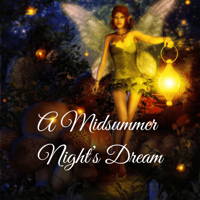
Overview
Synopsis
In one of the most famous of literary love quadrangles, A Midsummer Night’s Dream tells the tale of Hermia, Demetrius, Lysander, and Helena; four misguided lovers whose journey into the woods lands them in even more trouble, as members of the fairy kingdom decide to use them as veritable pawns in their own love games. Against the backdrop of the wedding of Duke Theseus and Hippolyta, and the fiery battle of wills between the Fairy King and Queen, Oberon and Titania, the four lovers are challenged by magic and trickery to finally work out what love is all about.
Show Information
Context
Show Origins
Shakespeare used several sources to create A Midsummer Night’s Dream, ranging from ancient mythology to books by his contemporaries. Probably the most significant source is Ovid’s Metamorphoses, an ancient Roman collection of mythology. Throughout the play, characters reference many mythological figures, ranging from Apollo and Daphne (the nymph who was turned into a tree to escape the romantic advances of the pursuing god), to Cupid’s attempt to shoot an arrow at a passing
to read the context for A Midsummer Night’s Dream and to unlock other amazing theatre resources!Plot
Act One
In Athens, Duke Theseus is preparing for his wedding to Hippolyta, Queen of the Amazons. Egeus, a nobleman, comes to Theseus with a complaint: his daughter Hermia refuses to marry Demetrius, the man he has chosen for her, because she loves Lysander. Theseus gives Hermia an ultimatum: marry Demetrius, face death, or become a nun. Hermia and Lysander plan to escape to Lysander’s aunt’s house outside Athens, where they can marry. They confide in Helena, Hermia's friend, who is in love
to read the plot for A Midsummer Night’s Dream and to unlock other amazing theatre resources!Characters
| Name | Part Size | Gender | Vocal Part |
|---|---|---|---|
|
Lead |
Male |
Non-singer |
|
|
Lead |
Male |
Non-singer |
|
|
Lead |
Male |
Non-singer |
|
|
Lead |
Female |
Non-singer |
|
|
Lead |
Female |
Non-singer |
|
|
Lead |
Male |
Non-singer |
|
|
Lead |
Female |
Non-singer |
|
|
Lead |
Male |
Non-singer |
|
|
Supporting |
Male |
Non-singer |
|
|
Supporting |
Male |
Non-singer |
|
|
Supporting |
Male |
Non-singer |
|
|
Supporting |
Male |
Non-singer |
|
|
Supporting |
Male |
Non-singer |
|
|
Supporting |
Male |
Non-singer |
|
|
Supporting |
Male |
Non-singer |
|
|
Supporting |
Female |
Non-singer |
|
|
Featured |
Male |
Non-singer |
|
|
Featured |
Female |
Non-singer |
|
|
Featured |
Female |
Non-singer |
|
|
Featured |
Female |
Non-singer |
|
|
Featured |
Female |
Non-singer |
|
|
Ensemble |
Either Gender |
Silent |
Songs
A song with an asterisk (*) before the title indicates a dance number; a character listed in a song with an asterisk (*) by the character's name indicates that the character exclusively serves as a dancer in this song, which is sung by other characters.
Monologues
Scenes
Key Terms
“Adieu” is a French word meaning “farewell,” often used in plays and operas with poetic or dramatic resonance. It can mark a character’s departure or foreshadow loss. Its use in dialogue underscores the emotional weight of saying goodbye.
An allusion is an indirect reference to another work of literature, art, historical event, or cultural figure. Playwrights often use allusions to add deeper meaning or context to a character’s dialogue or a scene.
An amateur is a person who engages in theatre for the love of the art rather than for financial gain. Amateur theatre includes school plays, community theatre, and non-professional productions that are vital to the broader theatrical ecosystem.
A child believed to be swapped by fairies; in drama, symbolizes identity and transformation.
A concluding speech or section that provides commentary or closure at the end of a play.
A genre of story involving magical and fantastical elements, sometimes adapted for theatrical performance.
A form of self-referential drama where the play draws attention to its own theatricality. This device challenges the audience’s suspension of disbelief and is used in Epic Theatre and postmodern works.
A body of traditional stories involving gods, heroes, and creation myths. Mythology provides inspiration for characters and narratives in global theatre traditions.
An introductory speech or scene that sets up the context or themes of a play. Prologues are commonly used in classical drama to prepare the audience for what follows.
Works not protected by copyright and available for free use or adaptation. Many classical plays, including Shakespeare's, fall into the public domain.
Describes a play or scene that acknowledges its own theatrical nature, often breaking the fourth wall or referencing the script itself.
Describes love or affection not returned or reciprocated, a common theme in classical and romantic drama.
Videos
Quizzes
Themes, Symbols & Motifs
THEMES
Appearance, Reality, and Illusion
to read about the themes, symbols and motifs from A Midsummer Night’s Dream and to unlock other amazing theatre resources!Quote Analysis
Ay me! for aught that I could ever read,
_Could

